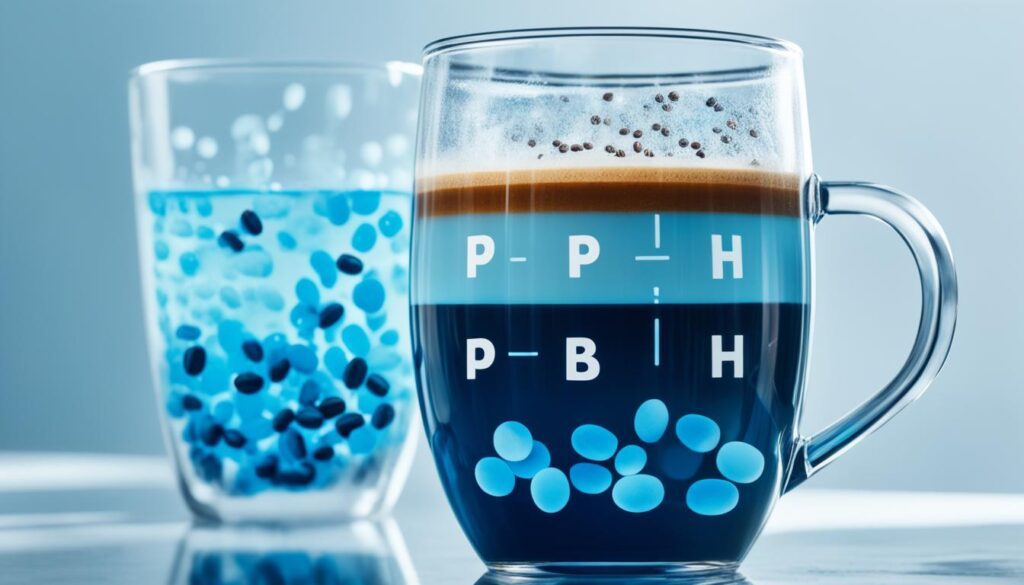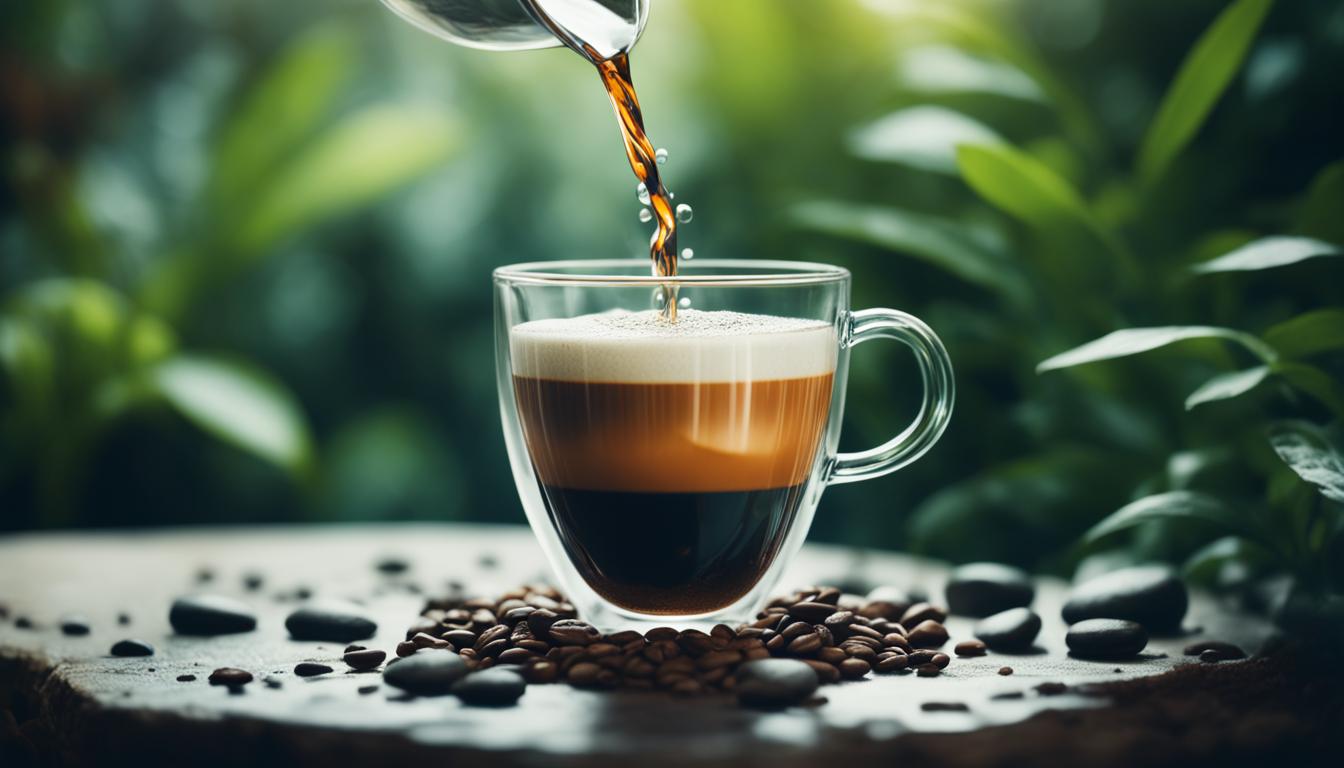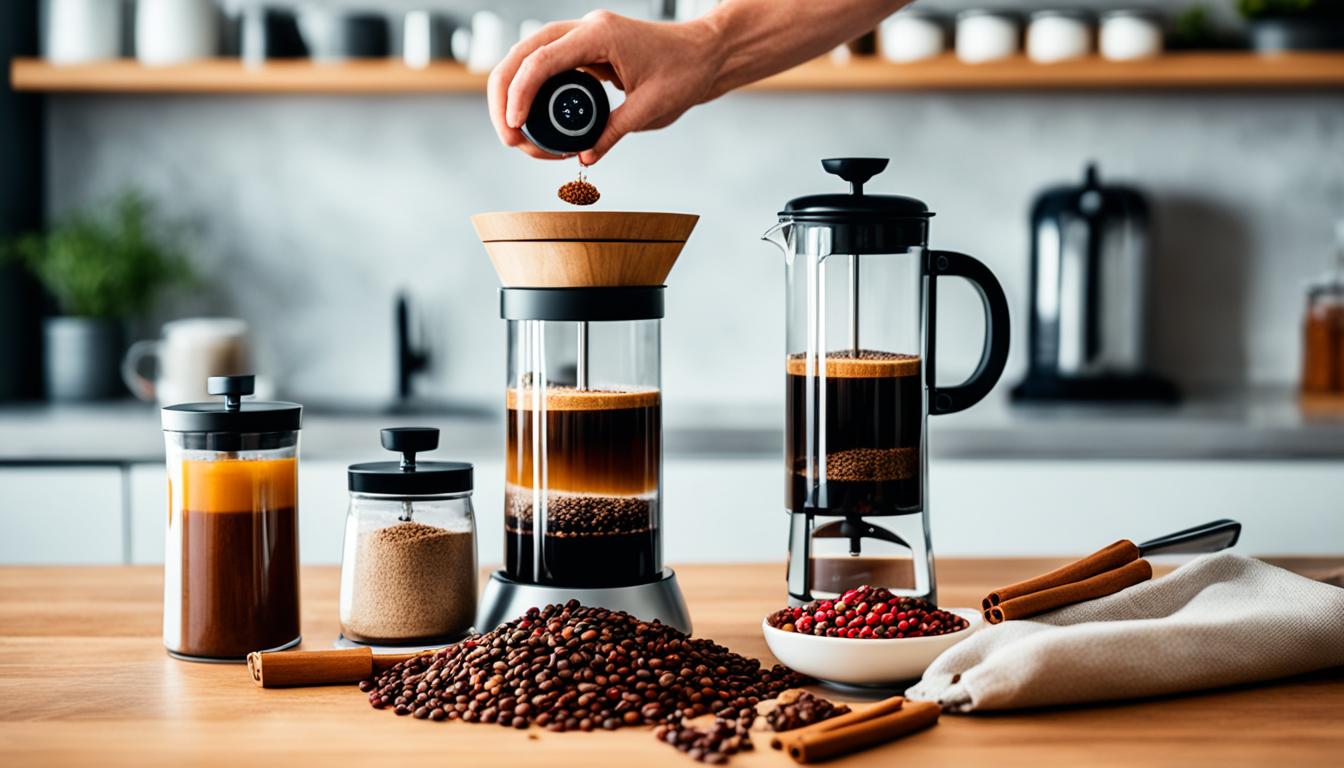Welcome to our guide on water quality for coffee brewing! When it comes to making the perfect cup of coffee, the quality of your water plays a crucial role. Not only does it affect the taste and aroma, but it also influences the extraction of flavors from the coffee grounds. That’s why understanding the importance of water quality and its impact on coffee brewing is essential for every coffee enthusiast.
Key Takeaways:
- Water quality significantly influences the flavor of espresso.
- Water hardness, pH, and total dissolved solids (TDS) are important factors to consider for optimal coffee brewing.
- An optimal hardness range of 50-80ppm, a pH range of 7-8.5, and a TDS within the common range are recommended for best results.
- Hard water can cause damage to coffee machines, while soft water can result in a sour taste.
- The pH of water should be maintained between 7 and 8.5 to avoid undesirable flavors.
- An optimal TDS within the recommended range is crucial for achieving balanced flavor extraction.
- By controlling these water parameters, you can enhance the flavor of your daily cup of coffee.
The Impact of Water Hardness on Coffee Flavor
Water hardness, characterized by the presence of magnesium and calcium, plays a crucial role in determining the flavor of coffee. Whether it’s espresso, pour-over, or French press, the quality of water used directly impacts the taste and aroma of the final cup. It’s essential to understand how water hardness affects coffee flavor to achieve the perfect brew.
When it comes to water hardness, extremes can have undesired effects. On one hand, hard water with high mineral content can lead to the buildup of minerals in coffee machines, obstructing flow and causing corrosion. On the other hand, soft water can result in a sour taste in coffee, as it fails to extract the full range of flavors from the coffee grounds.
In light of recent research, an optimal water hardness range of 50-80ppm is recommended for brewing espresso. This range strikes a balance between flavor extraction and machine protection, ensuring a flavorful cup of coffee without compromising equipment longevity.
Using water with optimal hardness promotes effective extraction and allows the natural characteristics of the coffee beans to shine through, enhancing the overall flavor experience.
Water Hardness Comparison Table
| Water Hardness | Effects on Coffee Flavor |
|---|---|
| Soft (below 50ppm) | Results in under-extracted coffee with a sour taste. |
| Optimal (50-80ppm) | Allows for balanced flavor extraction and protects coffee machines from mineral buildup. |
| Hard (above 80ppm) | Can lead to over-extracted flavors and machine damage due to mineral deposits. |
The Significance of Water pH in Coffee Brewing
The pH level of water is a crucial factor that significantly impacts the flavor of coffee. When water used for brewing coffee is too acidic, it can result in a sour taste, while water that is too alkaline can lead to a bitter flavor profile. To achieve the optimal coffee flavor, it is recommended to use water with a pH range of 7-8.5.
At this pH range, the extraction of flavors from the coffee grounds is enhanced, resulting in a more balanced and enjoyable cup of coffee. The acidity of the coffee interacts with the pH of the water, influencing the overall taste experience. By using water within the recommended pH range, you can avoid the extremes of sourness or bitterness and ensure a harmonious and well-rounded flavor profile.
However, it is important to note that extreme pH levels should be avoided in coffee brewing. Water with extremely high or low pH levels can lead to gas formation during the brewing process and result in prolonged extraction times. These undesirable effects can negatively impact the overall quality and flavor of the coffee.
“Water with a pH range of 7-8.5 ensures optimal coffee flavor by striking the right balance between acidity and alkalinity.”
By controlling and adjusting the pH level of the water used for brewing coffee, you can unlock the full potential of your coffee beans and achieve a superior taste experience. Experimenting with different water sources or using a water filtration system to modify the pH level can help you discover the optimal pH range for your specific coffee preferences and ensure consistently delicious cups of coffee.

With the right water pH level, you can enhance the natural flavors and nuances of your coffee beans, allowing their true character to shine through. It is a simple but crucial aspect of the coffee brewing process that can make a significant difference in the overall quality and satisfaction of your coffee drinking experience.
The Influence of Total Dissolved Solids (TDS) on Coffee Flavor
Total dissolved solids (TDS) are an essential factor to consider when brewing coffee. TDS refers to the concentration of various substances that are dissolved in water, including salts and organics. These dissolved solids have a significant impact on the extraction of compounds from the coffee grounds, directly influencing the flavor profile of your cup of joe.
According to extensive research in the field, the optimal TDS range for achieving the best flavor extraction in coffee falls within the common range. It is crucial to maintain a TDS level that ensures proper extraction, avoiding under-extracted or over-extracted flavors that can result from extreme TDS levels, whether too high or too low.
To achieve the ideal TDS level, you’ll need to pay attention to the water you use for brewing. Since TDS is the measurement of all dissolved substances, it can vary depending on the water source. Different factors, such as the mineral content and water treatment processes, can affect the TDS of your brewing water.
One way to ensure you have the optimal TDS for coffee extraction is through the use of water filtration systems. These systems can help remove impurities while maintaining the essential minerals necessary for flavor extraction. By using filtered water, you can control and adjust the TDS to achieve the desired balance and enhance the flavor of your coffee.
It is important to note that TDS is just one of the factors that contribute to the overall flavor of coffee. Water hardness, pH, and other parameters also play significant roles. Considering and optimizing all these factors will yield the best results in your brewing endeavors.
“The concentration of total dissolved solids in water has a direct impact on the flavor extraction during coffee brewing. Finding the optimal TDS range is crucial for achieving the perfect balance of flavors in your cup.”
| TDS Level | Flavor Extraction |
|---|---|
| Too Low (Below Recommended Range) | Under-extracted flavors, resulting in a weak and bland cup of coffee |
| Recommended Range | Optimal extraction, bringing out the full potential of flavors in the coffee |
| Too High (Above Recommended Range) | Over-extracted flavors, leading to a bitter and unpleasant taste |
Conclusion
The quality of water is crucial when it comes to brewing coffee, as it has a significant impact on the flavor of the final cup. Our research has shown that factors such as water hardness, pH, and total dissolved solids (TDS) play key roles in optimizing coffee flavor.
For the best results, it is recommended to use water with a hardness level ranging from 50 to 80ppm. This balance ensures optimal flavor extraction while avoiding any machine damage that may be caused by high mineral content in hard water.
Additionally, maintaining a pH range of 7 to 8.5 is essential. Water that is too acidic or alkaline can result in unpleasant tastes, such as sourness or bitterness. By staying within this pH range, you can enhance the extraction of flavors without introducing undesirable elements.
Lastly, keeping the total dissolved solids within the common range is vital for achieving optimal coffee flavor. Extreme levels, whether too high or too low, can lead to under-extracted or over-extracted flavors. By understanding and controlling these water parameters, you can enhance your daily coffee experience and enjoy a more flavorful cup.
FAQ
Why is water quality important for coffee brewing?
Water quality plays a significant role in the flavor of coffee. The minerals, pH, and total dissolved solids (TDS) in water can impact the extraction of flavors from coffee grounds, resulting in either enhanced or undesirable tastes.
How does water hardness affect coffee flavor?
Water hardness, which is the presence of magnesium and calcium in water, can affect coffee flavor. Hard water with a high mineral content can lead to machine damage, while soft water can result in a sour taste. The optimal hardness range for brewing espresso is 50-80ppm, which balances flavor extraction and machine longevity.
What is the significance of water pH in coffee brewing?
Water pH plays a critical role in coffee flavor. Acidic water can make coffee taste sour, while alkaline water can result in a bitter taste. The recommended pH range for optimal coffee flavor is 7-8.5, as it enhances flavor extraction without introducing undesirable tastes.
How do total dissolved solids (TDS) influence coffee flavor?
Total dissolved solids (TDS) in water, which include salts and organics, can affect the extraction of compounds from coffee grounds. Extreme TDS levels, whether too high or too low, can result in under-extracted or over-extracted flavors. Maintaining a TDS within the common range is crucial for achieving optimal coffee flavor.
What are the recommended water parameters for the best coffee flavor?
To optimize coffee flavor, aim for a water hardness of 50-80ppm, a pH range of 7-8.5, and a TDS within the common range. These water parameters have been found to yield the best flavor extraction in coffee, enhancing your daily coffee experience.




